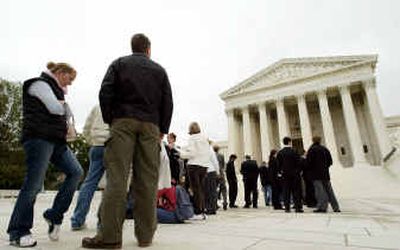Court weighs death penalty for those under 18 who kill

WASHINGTON – A divided Supreme Court weighed Wednesday whether to ban the death penalty for juveniles who kill, one of the highest-profile questions confronting the justices as they continue re-examining who is subject to capital punishment.
Two years ago, the court abolished the death penalty for the mentally disabled by a 6-3 vote and four of the nine justices went on record saying the court also should end the execution of offenders under age 18. But it was unclear Wednesday if they could gain a decisive fifth vote at arguments in the case of a Missouri man sentenced to die for robbing and killing a woman when he was 17.
Justice Anthony Kennedy, a potential swing vote, noted with concern that the United States is one of only a handful of countries to allow juvenile executions – but he also raised the possibility of violent gangs recruiting 16- and 17-year-olds as hit men if the teenagers are shielded from the death penalty.
“If we rule against you, the deterrent remains,” Kennedy told a lawyer representing the Missouri inmate, Christopher Simmons.
Kennedy and Justice Sandra Day O’Connor are expected to cast the deciding votes in the closely watched case. The two moderate justices both joined the court’s liberal wing in the court’s 2002 decision that executing the mentally disabled violates Eighth Amendment protections against “cruel and unusual punishment.”
O’Connor said little Wednesday, asking a single question about the number of states that permit death sentences for teens. One test before the court is whether public sentiment surrounding capital punishment has shifted since the Supreme Court, ruling in a Kentucky case in 1989, allowed states to execute killers who were 16 or older when they committed their crimes.
Washington, D.C., lawyer Seth P. Waxman, who served as U.S. solicitor general during the Clinton administration, represented Simmons on Wednesday before the court. Waxman said an evolving consensus against the juvenile death penalty and new research on brain development should persuade the court to abolish the practice.
But James R. Layton, Missouri’s state solicitor, countered that juries and state legislatures – not the court – should decide whether juveniles who kill are sentenced to death. He pointed to a Virginia jury’s decision to spare convicted sniper Lee Boyd Malvo a death sentence for carrying out the deadly Washington-area attacks when he was 17, with jurors citing Malvo’s age and the influence of an older co-defendant.
“There are 17-year-olds who are equally culpable to those who are 18, 20, 25 or some other age,” Layton said. He told the justices that they should not be swayed by the “marshaling of untested evidence” or international opinion, saying the decision “needs to be based on the mores of American society.”
The United States is one of only seven of countries that have allowed executions of young offenders since 1990, and the other countries – including China, Iran and Pakistan – have virtually abandoned the practice to conform with international human rights treaties.